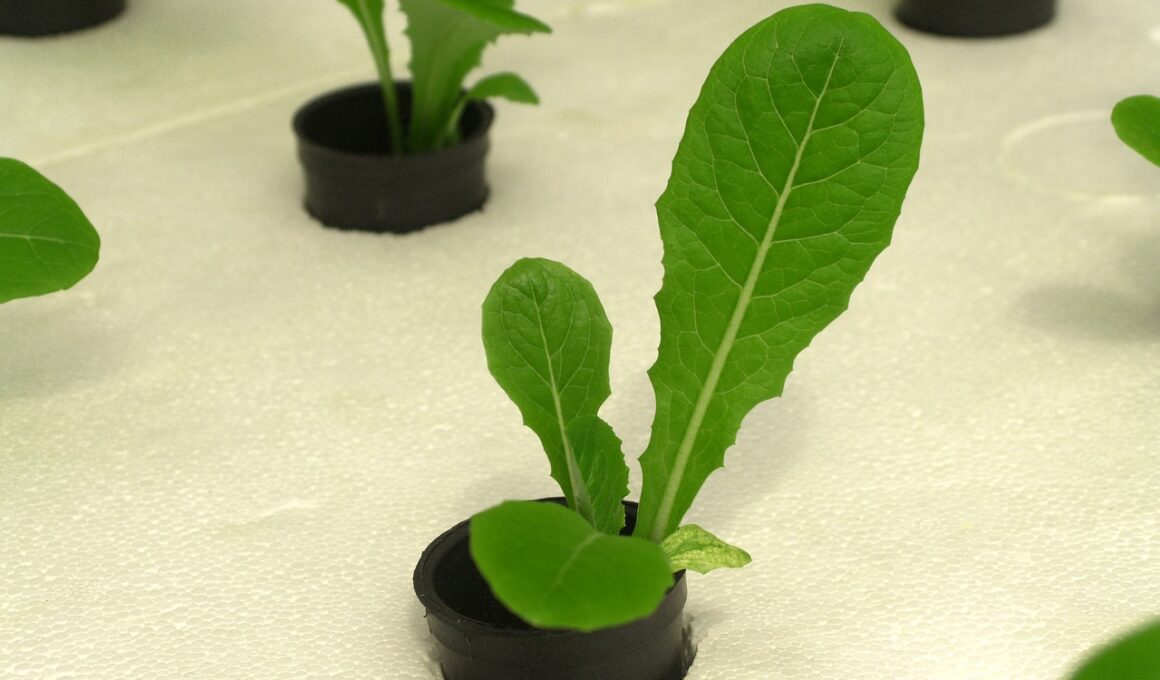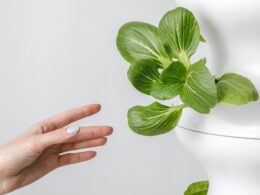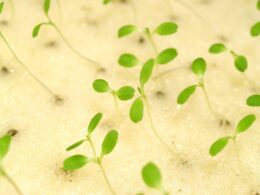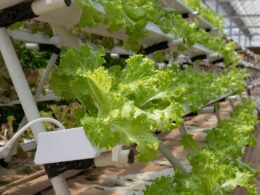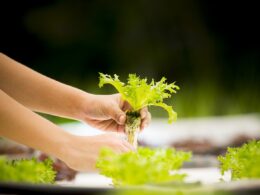Are you interested in hydroponic gardening but don’t know where to start? Hydroponics is a method of growing plants without soil, using nutrient-rich water instead. It’s a great way to grow plants indoors or in areas without access to soil, and it has many benefits over traditional gardening methods.
One of the biggest advantages of hydroponic gardening is the quick growth of plants. Since the plants receive all the nutrients they need directly, they can grow up to 50% faster than those grown in soil.
But with so many plants to choose from, which one is the fastest growing in hydroponics? In this article, we’ll dive into the factors that affect plant growth in hydroponics and reveal the fastest growing plants you can grow in your own hydroponic garden.
Benefits of Hydroponic Gardening
The perks of hydroponic gardening are numerous, including the ability to control nutrients and water levels for optimal growth and yield. Vertical gardening is an excellent way to maximize space and increase the number of plants you can grow.
Hydroponics also allows you to use nutrient solutions that are tailored to the needs of your plants, ensuring they receive everything necessary for healthy growth. In hydroponics, nutrient solutions are used to feed the plants directly, without the need for soil. This means that plants can grow faster and yield more produce than traditional gardening methods.
Additionally, hydroponic gardening is a great way to conserve water, as the water used in the system is recycled and reused. This is especially important in areas where water is scarce, as hydroponics can help reduce water usage significantly.
Overall, hydroponic gardening is an excellent option for those who want to grow plants quickly and efficiently. With the ability to control nutrients and water levels, as well as the flexibility of vertical gardening, it’s no wonder that hydroponics is becoming increasingly popular. So if you’re looking for a way to grow plants faster and with less water, consider giving hydroponics a try.
Factors Affecting Plant Growth in Hydroponics
Factors can impact how well plants thrive in hydroponic systems. It’s important to keep track of the pH level of the nutrient solution used to grow plants. The pH level should be monitored regularly as it can affect the availability of nutrients to plants. The ideal pH level for most hydroponic plants is between 5.5 to 6.5.
If the pH level is too high or too low, it can lead to nutrient deficiencies or toxicities. Nutrient solution formulation is another factor that can affect plant growth in hydroponics. The nutrient solution should contain all the essential nutrients required by plants in the right amounts. The solution should be changed regularly to ensure that the plants are getting the required nutrients.
Overfeeding or underfeeding plants can lead to stunted growth or poor yield. It’s important to follow the recommended nutrient solution formulation for the specific plants being grown. In summary, pH level management and nutrient solution formulation are crucial factors that can affect plant growth in hydroponics.
Regular monitoring of the pH level and nutrient solution formulation is necessary to ensure that plants are getting the required nutrients. By keeping these factors in check, you can ensure that your plants thrive in hydroponic systems and produce a bountiful harvest.
Fastest Growing Plants in Hydroponics
If you’re looking for the fastest growing plants in hydroponics, you should consider leafy greens, herbs, and tomatoes. These plants thrive in hydroponic systems because they require minimal soil and are able to absorb nutrients quickly.
With proper care and maintenance, you can expect these plants to grow at an impressive rate, giving you a bountiful harvest in no time.
Leafy Greens
Leafy greens are a popular choice for hydroponic growers due to their ability to thrive without soil. These plants, such as lettuce, spinach, and kale, only require nutrient solutions and proper light requirements to grow and flourish. This makes them perfect for hydroponic systems, where growers can control the environment and provide the necessary conditions for optimal growth.
One of the fastest-growing leafy greens in hydroponics is lettuce. With the right conditions, lettuce can grow up to three times faster than in soil. The key to growing fast and healthy lettuce in hydroponics is to ensure that they receive the right amount of light, nutrients, and water.
With these factors in check, you can expect to harvest crisp and delicious lettuce in just a few weeks. So, if you’re looking for a fast-growing plant to add to your hydroponic garden, give leafy greens a try!
Herbs
You’ll love growing herbs in your hydroponic system and enjoying fresh, flavorful additions to your meals. Herbs are one of the fastest growing plants in hydroponics and they can thrive in a variety of systems.
Here are some popular herb varieties you can grow in your hydroponic garden:
- Basil – a staple in Italian cuisine, basil is easy to grow and adds a fresh, aromatic flavor to dishes.
- Mint – perfect for teas, cocktails, and desserts, mint can be grown in water or in a soilless medium.
- Rosemary – a woody, fragrant herb that can be used to season meats and vegetables, rosemary grows well in deep water culture systems.
To get the best results with your hydroponic herbs, there are a few techniques you should keep in mind. First, make sure your pH levels are within the appropriate range for your chosen herb. Secondly, ensure that your herb plants get enough light and nutrients. Finally, keep an eye out for pests and diseases, which can quickly spread in hydroponic systems.
With these tips in mind, you’ll be well on your way to growing a bountiful herb garden in your hydroponic system.
Tomatoes
Growing tomatoes in your hydroponic system is a great choice if you want to experience the sweetness of fresh tomatoes all year round. There are a wide variety of tomato plants that you can choose from, such as cherry tomatoes, beefsteak tomatoes, and heirloom tomatoes.
Keep in mind that each variety of tomato has different growing requirements, so make sure you select the right one for your hydroponic system.
When it comes to nutrient solutions, tomatoes require a lot of nutrients to thrive. A balanced nutrient solution that contains all the necessary nutrients such as nitrogen, phosphorus, and potassium is crucial for healthy tomato growth.
Be sure to monitor your tomato plants and adjust the nutrient solution as needed to ensure optimal growth and fruit production. With the right tomato variety and nutrient solution, you can enjoy delicious and juicy tomatoes from your hydroponic system all year round.
Tips for Successful Hydroponic Gardening
If you want to ace hydroponic gardening, these tips will help you achieve your goals in no time.
First and foremost, nutrient solution is one of the most important factors in successful hydroponics. Make sure to use a balanced nutrient solution that contains the necessary minerals and nutrients for your plants to thrive.
Additionally, pH balance is another essential element for successful hydroponic gardening. Keep a close eye on the pH level of your nutrient solution and adjust it as needed to ensure your plants are getting the optimal level of nutrients.
To really excel at hydroponic gardening, it’s important to pay attention to the details. Here are a few tips to help you get started:
- Keep your growing environment clean and free of debris to prevent the growth of harmful bacteria and pests.
- Monitor your plants closely and adjust your nutrient solution and pH balance as needed to ensure optimal growth.
- Use high-quality equipment and materials to ensure the best results.
By following these tips, you can create a safe and successful hydroponic garden that will provide you with fresh produce all year round. Whether you’re a seasoned gardener or just starting out, these tips will help you achieve your goals and create a thriving garden that you can be proud of.
So why wait? Start your hydroponic garden today and see the amazing results for yourself!
Conclusion and Future of Hydroponic Gardening
Now that you’ve learned some tips for successful hydroponic gardening, it’s time to talk about the future of this innovative farming technique.
With the world’s population continuing to grow and space becoming more limited, vertical farming techniques are becoming increasingly popular. This involves stacking layers of plants on top of each other to maximize space and increase yields. Not only does this save space, but it also allows for better control over temperature, lighting, and nutrients.
In addition to vertical farming techniques, sustainability practices are also becoming more important in hydroponics. With traditional agriculture, there’s a lot of waste, including water and fertilizers. In hydroponics, water usage can be significantly reduced thanks to recirculating systems and the ability to reuse water. Additionally, nutrient solutions can be tailored to the specific needs of each crop, reducing the amount of fertilizer needed. Overall, hydroponics has the potential to be a more environmentally friendly way of growing crops.
As hydroponics continues to evolve, it’s exciting to think about the possibilities for the future. With more research and development, we may be able to grow crops faster and more efficiently than ever before. And with a focus on sustainability, hydroponics may just be the key to feeding our growing population while also protecting the environment.
So if you’re interested in trying your hand at hydroponic gardening, there’s never been a better time to start.
Frequently Asked Questions
What are the disadvantages of hydroponic gardening compared to traditional soil-based gardening?
When it comes to gardening, there are two main options: traditional soil-based gardening and hydroponic gardening. While hydroponics offers some advantages, there are also some disadvantages in comparison to soil-based gardening.
One of the biggest disadvantages is the maintenance challenges that come with hydroponic gardening. You need to provide the right nutrients and pH balance for your plants, and any mistake can lead to disastrous results. Additionally, hydroponic gardening requires more attention to detail and careful monitoring than soil-based gardening.
Overall, while hydroponics can be a great way to grow plants, it’s important to weigh the disadvantages comparison to soil-based gardening before committing to a hydroponic setup.
Can hydroponic plants be grown without the use of artificial lighting?
You’re probably wondering if you can grow hydroponic plants without artificial lighting. The simple answer is yes, but it depends on the type of plant and the amount of natural light available.
Some plants require more light than others, and if you’re relying solely on natural light, you’ll need to make sure your plants are getting enough of it. The impact of temperature on hydroponic plant growth is also important to consider. If the temperature is too hot or too cold, it can negatively affect the growth of your plants.
Ultimately, it’s possible to grow hydroponic plants without artificial lighting, but you’ll need to pay attention to the light and temperature requirements of your plants to ensure they thrive.
What is the ideal pH level for hydroponic plant growth?
To achieve optimal growth in hydroponic plants, pH management is essential. The ideal pH level for hydroponic plant growth is between 5.5 and 6.5. This range creates a favorable environment for nutrient absorption, which is crucial for plant development.
Maintaining a proper pH level ensures that the plants receive the correct amount of nutrients, which leads to healthy growth. It’s important to regularly monitor and adjust the pH level to avoid any deficiencies or excesses in nutrient absorption. Proper pH management promotes a safe and successful hydroponic gardening experience, allowing you to reap the benefits of a thriving garden.
How can hydroponic gardeners prevent pests and diseases from affecting their plants?
To keep your hydroponic plants healthy and free from pests and diseases, there are several preventive measures you can take. One of the most effective ways is to maintain a clean growing environment by regularly disinfecting your equipment and surfaces.
You can also introduce natural predators to your garden, such as ladybugs or praying mantises, to control pests like aphids. Additionally, using natural remedies, such as neem oil or garlic spray, can help to deter pests and diseases from taking hold.
By being proactive in your approach to plant care, you can ensure that your hydroponic garden remains vibrant and thriving.
Are there any legal restrictions on hydroponic gardening, such as zoning laws or licensing requirements?
Before starting your hydroponic garden, it’s important to research any legal restrictions that may apply to your area. Licensing requirements and zoning laws can vary depending on where you live, and it’s important to ensure that you comply with these regulations to avoid any legal issues down the road.
While many areas do not require a specific license for hydroponic gardening, some may have specific requirements that you must meet. Zoning laws may also impact where you can set up your garden, so it’s important to check with your local authorities before starting your project.
By taking the time to research and comply with any legal restrictions, you can ensure that your hydroponic garden is safe and legal.
Conclusion
Congratulations! You’ve learned about the benefits of hydroponic gardening and the factors that affect plant growth. You’ve also discovered the fastest growing plants in hydroponics.
With these tips, you can now successfully start your own hydroponic garden.
In conclusion, hydroponic gardening is a sustainable and efficient method of growing plants. It allows you to grow plants faster and with less water than traditional soil-based gardening.
As the world’s population continues to grow, we’ll need more food to feed everyone. Hydroponic gardening has the potential to play a significant role in meeting this demand.
So, whether you’re a seasoned gardener or a beginner, give hydroponic gardening a try and see the benefits for yourself!





